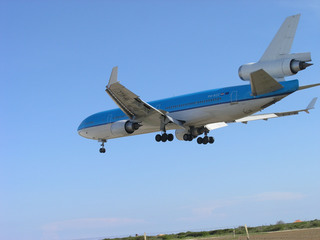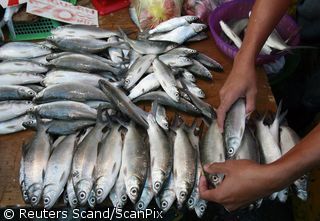Poland has received a dressing down from the European Commission
Published:
20 February 2005 y., Sunday
The EC says Poland needs to be more aggressive with its fiscal adjustment if it wants to enter the eurozone.
The response came after Poland presented an updated version of its convergence program, known as the Hausner plan, after Deputy Prime Minister Jerzy Hausner, that was markedly less ambitious than the original version. It sets out a gradual reduction of the budget deficit from 5.4 percent of GDP in 2004 to 2.2 percent by 2007. In the original plan, the budget deficit was planned to be just 1.5 percent of GDP by 2007.
These new figures are based upon real GDP growth of 4.9 percent on average in 2005 and 2006, down from 5.7 percent in 2004. In 2007 the economy is predicted to rebound with a 5.6 percent growth in GDP, something which analysts remain skeptical about.
In order to meet the criteria for entry to the EU, Poland would have to fully implement the comprehensive measures contained within the Hausner plan. This would mean a 4.7 percent impact on GDP for 2005-2007 and, although Poland has satisfied Brussels that it can correct the budget deficit in the short term, the risky strategy leaves many obstacles to getting the deficit below three percent of GDP by 2009, a key requirement for entering the single currency. EC officials also criticized the government's lack of specific steps to secure a long-term balance of public finances.
However, the Polish government remained resolute in the face of the EC critique. "Poland will enter the eurozone in 2009," Hausner asserted. "The government maintains its convergence plan. I know nothing about any change of the government stance." Addressing the EC, Hausner said: "Your anxiety is understandable, but we do what we think is proper. Stop worrying unnecessarily."
Šaltinis:
Warsaw Business Journal
Copying, publishing, announcing any information from the News.lt portal without written permission of News.lt editorial office is prohibited.
The most popular articles
 The European Commission has today decided to close the formal investigation procedure into the agreement between Bratislava Airport in Slovakia and Ryanair after concluding that the airport operator acted as a market economy investor and therefore no advantage has been granted to Ryanair.
more »
The European Commission has today decided to close the formal investigation procedure into the agreement between Bratislava Airport in Slovakia and Ryanair after concluding that the airport operator acted as a market economy investor and therefore no advantage has been granted to Ryanair.
more »
 The coffee industry of Jamaica represents one the largest earners of foreign exchange, approximately US$30 million in 2008.
more »
The coffee industry of Jamaica represents one the largest earners of foreign exchange, approximately US$30 million in 2008.
more »
 On January 13, 2010, the Executive Board of the International Monetary Fund (IMF) concluded the Article IV consultation with Mauritius.
more »
On January 13, 2010, the Executive Board of the International Monetary Fund (IMF) concluded the Article IV consultation with Mauritius.
more »
 The World Bank's International Development Association and the International Monetary Fund have agreed to support US$1.6 billion in debt relief for the Islamic Republic of Afghanistan.
more »
The World Bank's International Development Association and the International Monetary Fund have agreed to support US$1.6 billion in debt relief for the Islamic Republic of Afghanistan.
more »
 The Common Agricultural Policy plays a critical role in helping farmers to deliver environmental goods and services, provided that policies are targeted in the right way.
more »
The Common Agricultural Policy plays a critical role in helping farmers to deliver environmental goods and services, provided that policies are targeted in the right way.
more »
 Regional Policy Commissioner Paweł Samecki will meet Croatia's Prime Minister Jadranka Kosor and members of her government in Zagreb on 25-26 January to discuss the country's preparations for accession in the context of the EU cohesion policy.
more »
Regional Policy Commissioner Paweł Samecki will meet Croatia's Prime Minister Jadranka Kosor and members of her government in Zagreb on 25-26 January to discuss the country's preparations for accession in the context of the EU cohesion policy.
more »
 The World Bank Board of Directors today approved US$20 million for the Dominican Republic in support of the Municipal Development Project, which aims to improve the technical and financial capacity of local governments.
more »
The World Bank Board of Directors today approved US$20 million for the Dominican Republic in support of the Municipal Development Project, which aims to improve the technical and financial capacity of local governments.
more »
 The European Investment Bank (EIB) is lending EUR 400 million to Ford Romania SA for the expansion and refurbishment of the company’s existing car assembly plant located in Craiova in the South-West of Romania.
more »
The European Investment Bank (EIB) is lending EUR 400 million to Ford Romania SA for the expansion and refurbishment of the company’s existing car assembly plant located in Craiova in the South-West of Romania.
more »
 The Agriculture Council of the European Union has examined ways to improve the functioning of the food supply chain with the ultimate aim of controlling the fluctuation in prices and ensuring a more equitative distribution of the added value throughout the chain.
more »
The Agriculture Council of the European Union has examined ways to improve the functioning of the food supply chain with the ultimate aim of controlling the fluctuation in prices and ensuring a more equitative distribution of the added value throughout the chain.
more »
 The European Commission has today approved an application from Lithuania for assistance under the Globalisation Adjustment Fund (EGF).
more »
The European Commission has today approved an application from Lithuania for assistance under the Globalisation Adjustment Fund (EGF).
more »